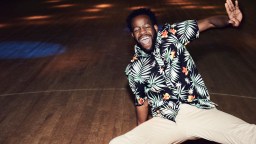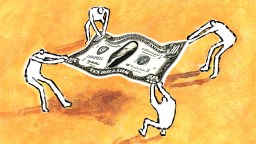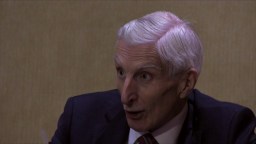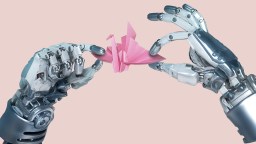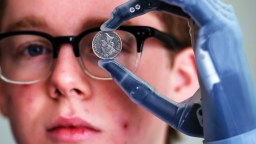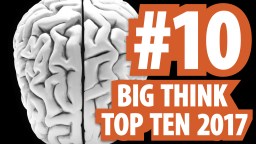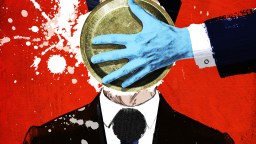All Videos
All Stories
What happens to a nation that only reads headlines? They get journalists who chase clicks, rather than facts.
▸
4 min
—
with
We used to use technology. Now technology uses us. Silicon Valley ethicist Tristan Harris explains how the attention economy hijacked our self-worth for profit.
▸
9 min
—
with
Humans tend to hunker down in our own minds and trust what we already believe to be true. This emotion-based way of thought isn’t often the best way to think about anything, and often leads to gridlock.
▸
7 min
—
with
Does working hard make you more money or does it just enrich shareholders? The concept of hourly wages could soon be eradicated.
▸
7 min
—
with
Fr. Thomas Joseph White on the source of our religious inclinations.
▸
with
Can philosophy give you true understanding about life, the universe, and everything? Sometimes it Kant.
▸
4 min
—
with
Reality is whatever your body believes. Virtual reality knows how to hack that.
▸
5 min
—
with
RIP pessimists, we barely knew you. Carnegie Mellon University’s Professor Michael Scheier explains the impact your outlook has on the world inside of you, from your cells to your psychology.
▸
7 min
—
with
The most make-or-break aspect of job automation? How policy makers handle your transition into a new career.
▸
9 min
—
with
Knowing how to tell a good story is like having mind control. Alan Alda shares some incredible tips for captivating a crowd—or nailing your next job interview.
▸
7 min
—
with
Haggling over a number? That’s a terrible way for people to negotiate, says Harvard International Negotiation Project head honcho Dan Shapiro.
▸
4 min
—
with
Populism won two big votes in 2016, while the global worldview suffered… well… “big league”. But how did we get to this big discord? And can populism and globalization ever get along?
▸
10 min
—
with
Lord Rees on “speculative physics,” the limits of the observable universe, and more.
▸
with
Former tennis pro James Blake makes a case for transparency in police departments.
▸
8 min
—
with
If you can’t stand the heat, get out of the kitchen. But if you’re a Michelin Star chef with a restaurant to run, you’re going to need a better coping strategy.
▸
4 min
—
with
California prisons are about as off-off-off-off Broadway as it gets—but that’s where the emotional tools of theatre can make the biggest difference to people’s lives.rn
▸
7 min
—
with
Primatologists and praying farmers show us why it takes a flexible brain, and many perspectives, to unlock truly groundbreaking science.
▸
8 min
—
with
Humans are a programmable species, and we live inside the most ancient operating system of all — ideology.
▸
8 min
—
with
Can computers be creative? Depends on whether you’re asking it to write music or write a novel.
▸
6 min
—
with
Can understanding science make pop culture better, and can understanding pop culture make science more interesting? Absolutely.
▸
10 min
—
with
Jennifer Doudna, the CRISPR co-creator, says that the genie of genetic engineering might be hard to put back in the bottle.
▸
3 min
—
with
Your brain stops at the most comforting thought. The truth is somewhere beyond that. Using scientific skepticism as a guide, astrophysicist Lawrence Krauss outlines the questions that critical thinkers ask themselves.
▸
6 min
—
with
Once upon a time, hope meant confronting suffering, not avoiding it. Have overly sugary connotations about hope diminished its true grit?
▸
9 min
—
with
Interest in learning certain skills, like computer science, can wax and wane with economic opportunity and job availability. But Gene Luen-Yang explains why it’s a valuable skill in any season.
▸
5 min
—
with
What people self-report about their sex lives can bear little relation to the truth. So how can the social status clinging to our conversations about sex be stripped away? Anonymous Google searches!
▸
3 min
—
with
We can’t seem to resist frequent rewards, which is why slot machines and social media are both so addictive. What’s more, they’re designed that way, purposefully, to keep you coming back.
▸
6 min
—
with
How is the rights movement progressing for LGBTQ people? Initial progress was made more quickly than anyone imagined, but lingering inequalities continue to stunt that rapid growth.
▸
5 min
—
with
Getting into an argument is easy. But getting out by having both sides see the other side? Not as impossible as you might think.
▸
8 min
—
with
Racism is the acting out of biases learned as early as preschool, research shows. If racism starts at three years old, so should science-backed strategies to reduce it.
▸
10 min
—
with
AI won’t really resemble humanoids. Instead, AI will create a world that countries and large companies can live in.
▸
9 min
—
with







